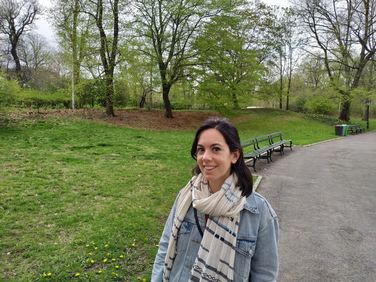 Tell us a little bit about yourself I’m from Barcelona, Spain. That’s where I got my Bachelor’s in Human Biology and my Ph.D. in Neuroscience. When I finished my PhD, I wasn’t completely sure that I wanted to stay in Academia, but I didn’t know what else could I do with my degree (!). So I decided to follow the traditional path and I came to New York to pursue a postdoctoral training at Columbia University. Actually, that was one of the best decisions I could have made! Columbia has an amazing Office of Postdoctoral Affairs, with a team of women dedicated to helping postdocs, like me, that we were kind of lost in Academia. Thanks to the OPA and after joining the Columbia University Postdoctoral Society, I realized that I could turn my science outreach volunteering activities into a professional career. Last year I transitioned to my dream job, as Education & Outreach Coordinator at the New York Genome Center. 'I realized that I could turn my science outreach volunteering activities into a professional career' What advice would you give yourself if you were starting your career today? What would you say to encourage other women to persevere in their career path? An important piece of advice that I would give my past self is to be more fearless and to look for mentors. When I decided I wanted to leave academia, I talked with a lot of successful women that also underwent the same transition that I was looking for. This helped me to feel more empowered and confident in my skills. Do not allow other people to tell you that something is not possible. What’s even more important, do not let yourself think that what you have accomplished is because of any sort of luck. Be confident about yourself and what you can accomplish! 'Be more Fearless and look for mentors' In your opinion, what is the best way to maintain work-life balance?
The academic environment has some sort of unspoken rules. One of the most dangerous rules is that you can´t have a work-life balance if you want to be a successful scientist (successful probably meaning high-impact factor first author). During my career inside academia, I have always tried to challenge this rule. I have been very invested in my science and scientific projects when I had to, without forgetting about my friends, family and those other activities besides science that make me happy. Science can be very frustrating sometimes, so it is crucial to have other things in your life that can give you joy when your experiment fails. What are the things that keep you motivated in your everyday life? Do you have any daily ritual that helps you stay consistently motivated and balanced? One of the things that keeps me motivated is knowing that the work that I do has an impact on somebody. When I was working as a scientist, I was really invested in understanding the molecular mechanisms underlying certain diseases. In my current position, I get to develop education & outreach programs that aim to increase the representation of underrepresented groups in STEM. It is very rewarding to work within the academic environment to ensure that the next generation of scientists is a little bit more diverse and inclusive. And who knows, maybe we find out that increasing diversity and inclusion creates a more welcoming and supportive environment. Comments are closed.
|
Archives
May 2025
Categories
All
|
 RSS Feed
RSS Feed